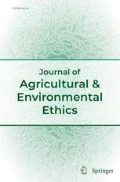Abstract
Unauthorized appropriation of geneticresources has been described by the term``biopiracy.'' Technological breakthroughsincluding biotechnological applications canincrease considerably the instrumental value ofbiodiversity as new products or products withnew properties can be made. Nevertheless, itappears that, in most cases, the properties inquestion were already known to the indigenouspeople and used for centuries. The analysisdiscusses both from an economic and an ethicalperspective whether it is just that traditionalknowledge is rewarded. As the conflictintensifies over questions of ownership andcontrol of biological materials, IntellectualProperty Rights are at the center ofcontroversies. The current global systemgoverning biotechnology has largely been shapedby Western expectations and valuations andconsequently has drawn severe criticism. Thecritics doubt both the stability andsustainability of the current patent system andargue for restructuring through benefit-sharingsystems in order to address some of theexisting inequalities. With the help of a casestudy (US patent no. 5,751 on ayahuasca) thetheoretical notion of biopiracy is applied toreal problems.
Similar content being viewed by others
REFERENCES
Altieri, M. A., The Myths of Agricultural Biotechnology: Some Ethical Questions,Discussion paper (University of California, Berkeley, 1998), http://www.cnr.berkeley.edu/~agroeco3/the_myths.html (retrieved on 19/2/2003).
Brush, S., Genes in the Field: On-Farm Conservation of Crop Diversity (Lewis Publishers, Ottawa/Rome, 2000).
Commission on Intellectual Property Rights, Integrating Intellectual Property Rights and Development Policy, Report (London, 2002), http://www.iprcommission.org (retrieved on 14/1/2003).
Correa, C.M., Traditional Knowledge and Intellectual Property, Discussion paper (Quaker United Nations Office, Geneva, 2001).
Correa, C. M., Options for the Implementation of Farmers' Rights at the National Level, Working paper (South Centre, 2000), http://www.southcentre.org/publications/ farmersrights/toc.htm#TopOfPage (retrieved on 2/3/2003).
Crespi, R. S., “An Analysis of Moral Issues Affecting Patenting Inventions in the Life Sciences: A European Perspective,” Science and Engineering Ethics 6(2) (2000), 157–180.
The Crucible II Group, Seeding Solutions. Policy Options for Genetic Resources: People, Plants and Patents Revised (International Development Research Center, International Plant Genetic Resources Institute, Dag Hammarskjold Foundation 1, 2000).
The Crucible II Group, Options for National Laws Governing Control over Genetic Resources and Biological Innovations (International Development Research Center, International Plant Genetic Resources Institute,Dag Hammarskjold Foundation 2, 2001).
Dbar, B., Sui generis Systems for Plant Variety Protection, Discussion paper (Quaker United Nations Office, Geneva, 2002).
Earth Negotiations Bulletin, Summary of the Second Meeting of the Ad Hoc Open-Ended Inter-Sessional Working Group on Article 8(j) 9(228) (2002), 10.
Ehrlich, P. R. and A. H. Ehrlich, Extinction: The Causes and Consequences of the Disappearance of Species (Ballantine, New York, 1981).
EFB (European Federation of Biotechnology), Bioethics and Public Perceptions on Biotechnology, Advanced Workshop (Oxford, 2001).
Fowler, C., “Biotechnology, Patents and the Third World,” in V. Shiva and I. Moser (eds.), Biopolitics: a Feminist and Ecological Reader on Biotechnology (Zed Books/Third World Network, London/Penang, 1995).
India, Discussion Paper on Review of Article 27.3(b) submitted to the TRIPs Council in Geneva (1999).
Mae-Wan Ho, Genetic Engineering Dream or Nightmare? The Brave New World of Bad Science and Big Business (Gateway Books, Penang, 1998).
Mae-Wan Ho and T. Traavik, Why We Should Reject Biotech Patents from TRIPS. Scientific Briefing on TRIPS Article 27.3(b) (1999), http://www.i-sis.org.uk/trips99.php (retrieved on 3/3/2003).
Murphy, A., Biopiracy, an Emerging Human Rights Issue (2000), http://www.law.ecel.uwa.edu.au/elawjournal/Volume%201/Articles%20Vol_1/biopiracy.pdf (retrieved on24/11/2002).
Rural Advancement Foundation International, The Patenting of Human Genetic Material (Rafi Communique, 1994), http://www.rafi.org/communique/fltxt/19941.html.
Rural Advancement Foundation International, Biopiracy+10 (Rafi Communique, 2002).
Saunders, P., Ethical Aspects of Biotechnology and Genetically Modified Organisms (1999), http://www.i-sis.org.uk/response.php (retrieved on 16/12/2002).
Shiva, V., Biopiracy: The Plunder of Nature and Knowledge (South End Press, Boston MA, 1997).
Tansey, G., Trade, Intellectual Property, Food and Biodiversity, Discussion paper (Quaker United Nations Office, Geneva, 1999).
Visser B., D. Eaton D., N. Louwaars N., I. Van der Meer I, J. Beekwilder, and F. Van Tongeren, Potential Impacts of Genetic Use Restriction Technologies (GURTS) on Agrobiodiversity and Agricultural Production Systems. FAO Background Study Paper No. 17 (2002).
Warner, K. D., “Are Life Patents Ethical? Conflict between Catholic Social Teaching and Agricultural Biotechnology's Patent Regime,” Journal of Agricultural and Environmental Ethics 14 (2001), 301–319.
WIPO, Matters Concerning Intellectual Property and Genetic Resources, Traditional Knowledge and Folklore, Report (Geneva, 2001).
Author information
Authors and Affiliations
Rights and permissions
About this article
Cite this article
Tsioumanis, A., Mattas, K. & Tsioumani, E. Is Policy Towards Intellectual Property Rights Addressing the Real Problems? The Case of Unauthorized Appropriation of Genetic Resources. Journal of Agricultural and Environmental Ethics 16, 605–616 (2003). https://doi.org/10.1023/B:JAGE.0000004960.46753.df
Issue Date:
DOI: https://doi.org/10.1023/B:JAGE.0000004960.46753.df


